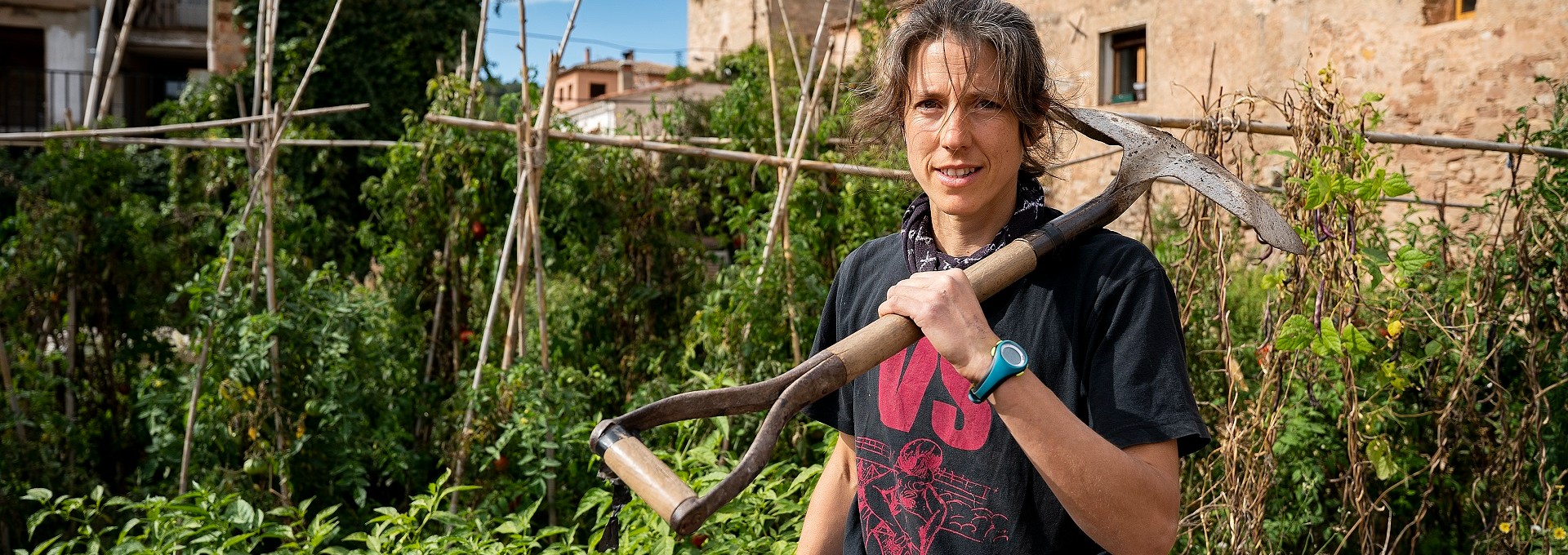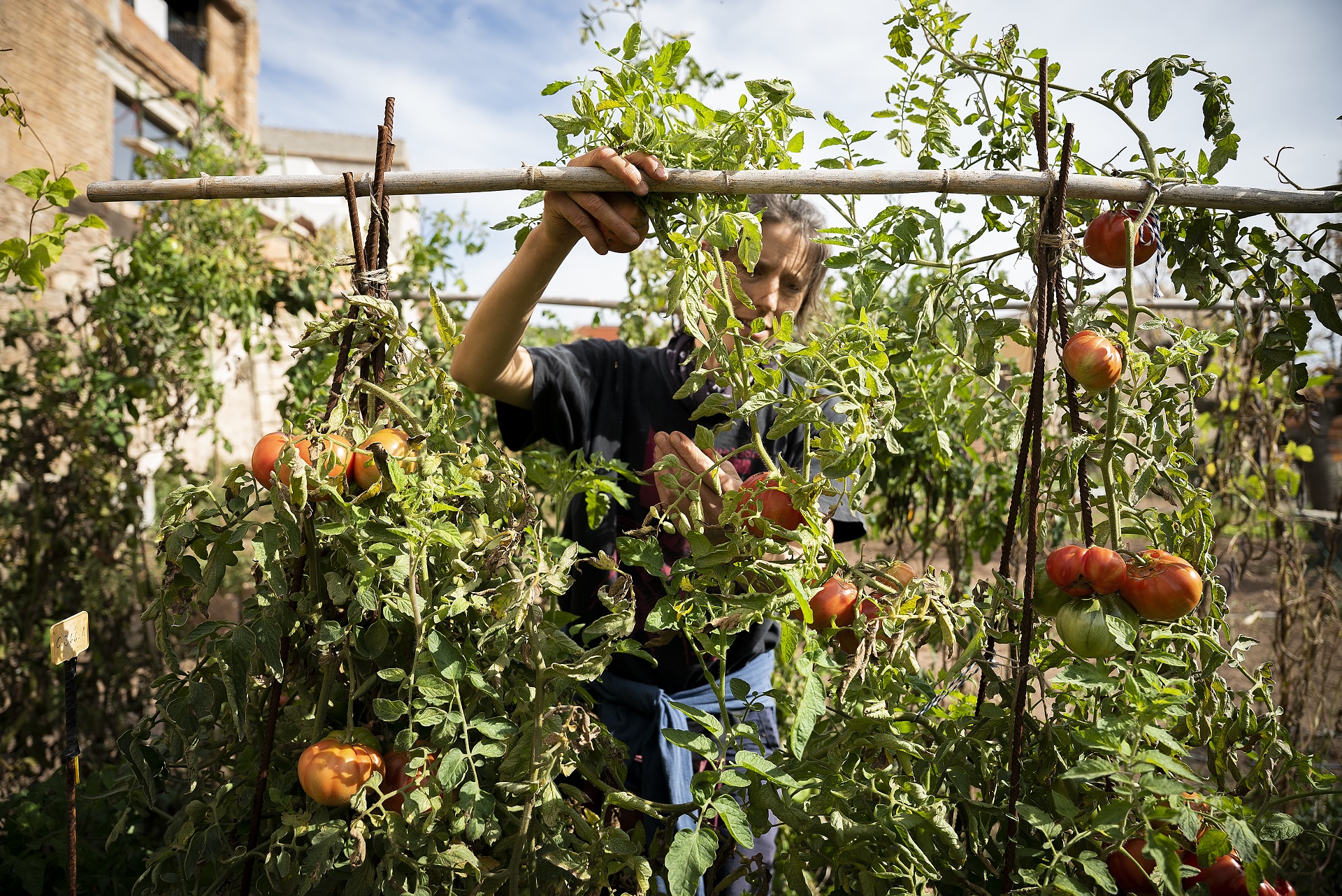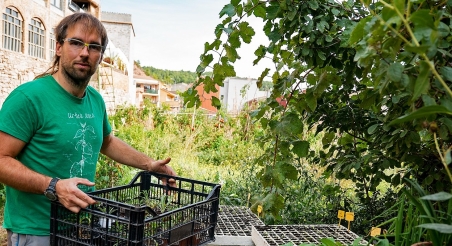Marta Palomas (Igualada, 1981) is a member of the Eixarcolant Collective. Together with Júlia Yuste, Ramon Gassó and Marta Ferrer, she’s responsible for reviving the use of neglected plants and seeds. After completing her agricultural engineering degree, specialising in gardening and landscaping, she worked for a time as a draftsperson until realising that what she really wanted to do was tend to an organic vegetable garden.
We meet Marta at the Eixarcolant headquarters in Jorba, in the county of Anoia, keen to find out about her life and career path, her links to farming and the origins of her passion for reviving old seed varieties and transforming the agrifood model. During our conversation, she gives us an exhaustive tour of the cooperative, including the cold room where the seeds are stored. We also stroll around the vegetable garden, where she invites us to taste the green leaf of a poppy, which we find delicious. This plant, often considered a weed, is now used in many salad leaf mixes, giving a twist to conventional salads. The name of the collective is a strong indication of the type of work it carries out, since the Catalan word eixarcolant means “weeding”. In this particular case, it’s about using so-called weeds as foods or remedies.
When and how did you begin to connect with farming and the land?
When I was young, I liked to be around plants. I remember telling my parents before I went to university that I was keen to pursue a training course in gardening. But they urged me to go to university to have “a better future”. Eventually, I decided to study agricultural engineering and it wasn’t until a few years later that I started working in what I really wanted to.
My first work experience was as a draftsperson, a job I didn’t like at all. I wanted to work with the land and grow an organic vegetable garden! When I got pregnant, I lost my job. My partner and I decided to move to Luxembourg. It was there that I started looking for jobs related to organic horticulture, but it proved impossible. What they do in that part of the world is the opposite of what we want to do here: in Luxembourg, absolutely everything is imported.
Afterwards, we moved to Belgium, where I started working with some farmers who grew organic apples. They did everything from growing the fruit to managing orders and selling direct to customers. In addition, they had a small supermarket and a fruit and vegetable shop. I could finally get my hands dirty!
Are there any experiences from your early years as a farmer that have had a particular impact on you? What did you learn from Belgian farmers? What was this change in your life and career path like?
It was a smooth transition, because I was finally doing what I really wanted to. During that time, I learned many things, but there was one especially significant event that made me see the world of farming with different eyes. One year, a freeze occurred just when the fields were in full bloom, and only 20% of the harvest survived. The farmers told me that, unfortunately, they wouldn’t be able to pay me the agreed wages... Luckily for them, the family had leased one hectare of their land to a young woman who practiced community-supported agriculture. In this farming system, which works very well, consumers pay the farmer in advance for their vegetables, thus sharing the risks of weather events and the negative impacts of climate change.
After this experience, I moved on to a small project somewhere else. In addition to adopting the same farming approach, in this project consumers also harvested their own vegetables. The farmer’s job was to cultivate and provide the harvesters with instructions: a yellow flag indicated the number of units that each person could harvest, while a green flag indicated that they could harvest as much as they wanted.
During my involvement in this project, I realised that I was both learning and doing what I really wanted to; that is, be a farmer and be in contact with the earth. Many people thought this was a strange wish for an agricultural engineer, but it was exactly what I wanted to do.
After this experience, when were you able to apply the knowledge you’d acquired about the land and farming systems somewhere new, namely Catalonia?
After separating from my husband, I decided to return to Catalonia with my daughter and start looking for work. My father told me about Marc Talavera, the president of Eixarcolant, so I contacted him to tell him I was looking for work. He replied that they weren’t looking for anyone at that time...
In 2018, I began to collaborate in a culinary event organised by the collective devoted to neglected plant varieties. Not long after, the opportunity to join the project arrived through a funding programme for young farmers. At first, my work wasn’t related to reviving the use of seeds, but rather to horticulture. I knew how to grow vegetables and how to run a vegetable garden, but when they started the seed bank project, I didn’t think twice. I think it’s such a beautiful task!
«I knew how to grow vegetables and how to run a vegetable garden, but when they started the seed bank project, I didn’t think twice. I think it’s such a beautiful task!» Marta Palomas
What advantages have being able to work with the land and being part of a cooperative entailed for you?
I believe that, apart from working with the land, at Eixarcolant we’re contributing to transforming the agrifood model. We’re building something. As I see it, being a farmer is about more than just tending to crops, inserting canes, growing and harvesting; we’re changing the model. It’s true that these are very complicated and difficult times, but I really like that. I like it a lot and what we’re doing isn’t easy, because we’re going against the grain. Large farming operations exist because these farmers saw that buying a tractor made everything easier and enabled them to cultivate more acres. And that by buying hybrid crop varieties, they could produce bigger yields. But I also think the current model is failing, so it’s necessary to try again by doing something different. That’s why I’m a farmer.
That said, let’s not make the mistake of thinking that farm work is easy, because it’s tough and really ties you down. Sometimes the wind is blowing hard at night and you think you need to get out of bed to close the greenhouse. Or when it doesn’t rain, for example, it’s stressful. It’s very different from a job where you’re sitting in front of a computer for a set number of hours.
Livestock farming ties you down even more. Unlike plants, cows have to be milked. If you leave plants well watered, you don’t have to worry about them over the weekend. But basically, you have to like farming. It’s a vocational job, in my opinion.
Luckily, at Eixarcolant we have an advantage: there are lots of us, so we can have rest days. We can go away with the family for a week with peace of mind, knowing that there’s someone else tasked with the work and that the crops won’t die. It’s tough work, but we don’t want to be slaves. The fact that there are lots of us gives us this peace of mind.
I like the work I do. I go to work happy and I’m close to home, another advantage when you have a family. What’s more, I work with some wonderful people: Eixarcolant has a great team! I can also say that, with the work I do, I’m contributing to making the future and the world a little better.
«I also think the current model is failing, so it’s necessary to try again by doing something different. That’s why I’m a farmer» Marta Palomas
Could you give a specific example of the social function you fulfil at Eixarcolant, considering the various areas of focus of the cooperative?
Next to the plot where we grow the plants, right in front of our headquarters, where the food production facility and cold room with the seed bank are located, we have a bakery, which we took over when the person who ran it died. We decided to look after it because we believe it’s much more than just a bakery: it’s a meeting point for townspeople! In addition, we make bread using local flours, thus supporting small farmers and people who have projects we really believe in. We’d like everyone to do the same and for those who have ideas to implement them.
When you buy bread from the Eixarcolant bakery, you’re not only buying bread, but also you’re helping us to buy flour from local farmers and vegetables from local horticulturists, which we use for our flatbread toppings, for example. This creates a support network in which everything is interconnected. Consumers are often unaware of this, but they hold a lot of power. When we decide how to consume, we influence many things. Buying frozen bread at the petrol station favours a certain production model. On the other hand, if you go to a village shop or small bakery where bread is made on the premises using local flours, your money is contributing to another type of model.
«Consumers are often unaware of this, but they hold a lot of power. When we decide how to consume, we influence many things» Marta Palomas
Since you’ve been working in the ancient seed bank, have you discovered any varieties whose continued existence has surprised you?
One lady brought us a garlic for drying that they’ve been growing for over 100 years, for instance. You meet people who are all too aware of what it means to have a seed that they’ve been preserving all their lives, only to realise as they get older that there’s no one around them who’s interested in preserving this legacy. They see Eixarcolant as an opportunity to ensure its continuity. Some people send us letters telling the story of these seeds. It’s so lovely!
«You meet people who are all too aware of what it means to have a seed that they’ve been preserving all their lives, only to realise as they get older that there’s no one around them who’s interested in preserving this legacy. They see Eixarcolant as an opportunity to ensure its continuity» Marta Palomas
Is there recognition of your work and the ecosystem network you’re nurturing?
There’s still a long way to go, but I think so. Lots of people tell us they’re grateful for the work we do. They congratulate us through social media, such as Instagram, or at food fairs. It’s gratifying to receive this recognition. But it must also be said that we’re not alone. In Catalonia, for instance, we have the Catalan Network of Granaries, an initiative that brings together the various seed banks that exist across Catalonia.
What actions do you take to raise awareness about the responsible use of resources such as water and food cultivation?
Regarding the management of our vegetable gardens, we use drip irrigation, since it allows us to optimise water consumption. As far as water is concerned, there’s not much more we can do. We irrigate with the water that accumulates in the lock, a dam that was built in ancient times to supply the village. We’re totally dependent on this water supply and it’s a real worry.
As for seeds, we use traditional native varieties, adapted to our territory. This will also help us in the future! In addition, we work with wild plant species and encourage people to grow them. These plants grow spontaneously in this part of the world and are totally adapted to their local environment. Take the poppies that sprout up in wheat fields, for example. We can eat the leaves. And these leaves can be mixed with other types of shoots and leaves to create a delicious salad!
The farmer Maria Riera has bought some wild plant seeds from us and has already started growing St. John’s wort and dandelions. Conducting experiments with these species, she’s created her own mesclun. But the most interesting thing is that once you obtain your own seeds, you no longer have to depend on anyone. You buy them once and that’s it! When the seed germinates, it will reproduce wherever you plant it. This entails all sorts of advantages. If you grow crops using your own seeds, you’re contributing to reducing the number of vehicles on the roads, because you can create your seedbed at home.
You’re now responsible for reviving neglected plant and seed varieties. How would you describe this task in relation to horticulture and how do they complement each other?
It’s a different task, but also a very beautiful one. In the Eixarcolant Seed Department, we take certain varieties and create datasheets for them, describing the characteristics of the plant and this specific variety, its origin, who’s supplied it, the number of years it’s been cultivated for, etc. We fill in the sheet, enclose the seeds and then register it in the national catalogue. Actually, it’s not always possible to register them, but that’s another story! Sometimes we’ve been told that the variety isn’t homogeneous and has many different morphotypes, which means it can’t be registered. They’d like all plants to be the same and identical, but in fact there’s beauty in diversity within the same variety. What’s more, this variability also makes them more resistant. Imagine if all individuals were the same, identical... A virus could kill us all off in no time! We see richness in genetic diversity, but regulations are often too rigid for it. We need to preserve diversity.
«We see richness in genetic diversity, but regulations are often too rigid for it. We need to preserve diversity» Marta Palomas
If you could give one piece of advice that reached a large number of people and helped redress injustices, what would it be?
My advice might seem rather silly, but actually it isn’t: before you consume something, consider whether you really need it. If we stopped buying things we don’t need, we could spend our money on products which, although perhaps more expensive, contribute to changing the economic model.
«Before you consume something, consider whether you really need it. If we stopped buying things we don’t need, we could spend our money on products which, although perhaps more expensive, contribute to changing the economic model» Marta Palomas
What gives you hope in your work and in the future of sustainable agriculture?
Seeing the project continue and the fact that there are people who share our ideas give us strength to trust that we’ll do things better, especially for the generations to come. I don’t know what the world of the future will be like, and sometimes I don't even want to imagine it, but we’re taking steps to change things. Among all the seeds I’m sowing, the one that’s teaching me the most is my daughter Vinyet. It’s a learning experience that everyone who’s decided to become a parent has to go through. At the end of the day, part of what we do is with our children and future generations in mind.
What advice would you give to your 20-year-old self?
I wouldn’t teach her any lessons. We have no idea what life will bring and, when all’s said and done, I believe you don’t learn by studying at university, but rather by living life. I think that if I hadn’t studied agronomy, maybe I would have still ended up working at Eixarcolant, who knows! I’d tell my 20-year-old self that she has to follow her own path and that, on this path, she’ll have to make decisions. These decisions won’t be bad or good, but she’ll have to deal with the consequences as best she can and should always do what she feels is the right thing.
— BCN Smart Rural Editorial —




